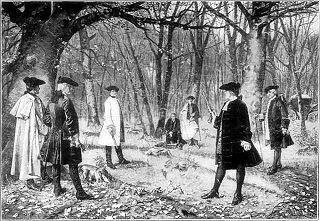The historical record is clear. On July 11, 1804 Aaron Burr (then Vice-President of the United States) engaged in a duel with Alexander Hamilton (“Founding Father” and former Secretary of the Treasury) below the cliffs in Weehawken, NJ. Both men discharged their Wogden dueling pistols. The intentions of the protagonists have been a matter of debate. Hamilton’s shot sailed considerably high and wide, fueling speculation that he intended to delope (throw away his fire). Burr’s shot found its mark, and a day later Hamilton died from his wound.

The feud between the two men, conducted for the most part in published opinions and speeches, simmered for years. The root cause for the mutual animosity lay in their differing political beliefs, but matters came to a head when their disagreement took a different tack during a chance meeting at Fraunces Tavern on June 20, 1804.
What transpired on that day was a “duel” of a different sort. The verbal war of words had escalated and was faithfully recorded by Amos Whitwater of the New York Evening Post (the newspaper founded by Alexander Hamilton). An extract is included herein.
{New York City, Twenty-First June, 1804} Neither A. Hamilton nor A. Burr expected to see each other at Fraunces Tavern. The different points of view of the two men have been well recorded and need no further elaboration here. Upon seeing Burr enter the room, Hamilton rose from his table and declared “I am grateful, Sir, for your maieutic inquiry about my views.”
Burr, not recognizing the word, questioned the use of maieutic. Mr. Hamilton returned, “The word, Sir, comes from the Greek word for mid-wifery: ‘maieutikos’. The great Plato, in one of his dialogues describes Socrates using maieutikos as a method of bringing forth new ideas by reasoning. Not that this would do you much good, Mr. Burr.”
Mr. Burr approached Mr. Hamilton, paused and pointed an accusatorial finger and said, “Sir, it continues to astound me that your arguments show a stunning lack of ratiocination!” Mr. Hamilton put down the damask napkin that was in his hand and questioned, “Ratiocination?” Burr explained, “Ratiocination — the process of exact thinking! In this regard, Sir, you fail!”
A look of bemusement descended on Mr. Hamilton’s face. He retrieved his napkin from the table, dabbed both corners of his mouth and calmly said, “Mr. Burr, you are a Stinky Ca-Ca.” Mr. Burr seized the napkin from Mr. Hamilton’s hand, “Stinky Ca-Ca, Sir?” Hamilton took back his napkin, “The Stinky Ca-Ca, Sir, an unimportant and ineffectual Indian Tribe!”
“You insult me, Mr. Hamilton! You are a base scoundrel, Sir!” Mr. Burr thundered, he took back the napkin, struck Mr. Hamilton thrice in the face and announced, “You may withdraw your words here and now! Or I will have my honour restored on a dueling field!”
“Sir, my seconds will call on your seconds and a time and place will be selected that will put closure to our dispute!” Mr. Hamilton responded, “One way or another, our matters will be resolved! Good evening, Mr. Burr!”
The outcome of this affair remains to be written. It is the hope of all that cooler heads will prevail. A. Whitwater
Cooler heads did not prevail and on July 11 both men proceeded to their agreed upon appointment. After felling Hamilton with his shot, Aaron Burr handed his pistol to his second, William P. Van Ness, and was heard muttering, “Stinky Ca-Ca indeed!”
